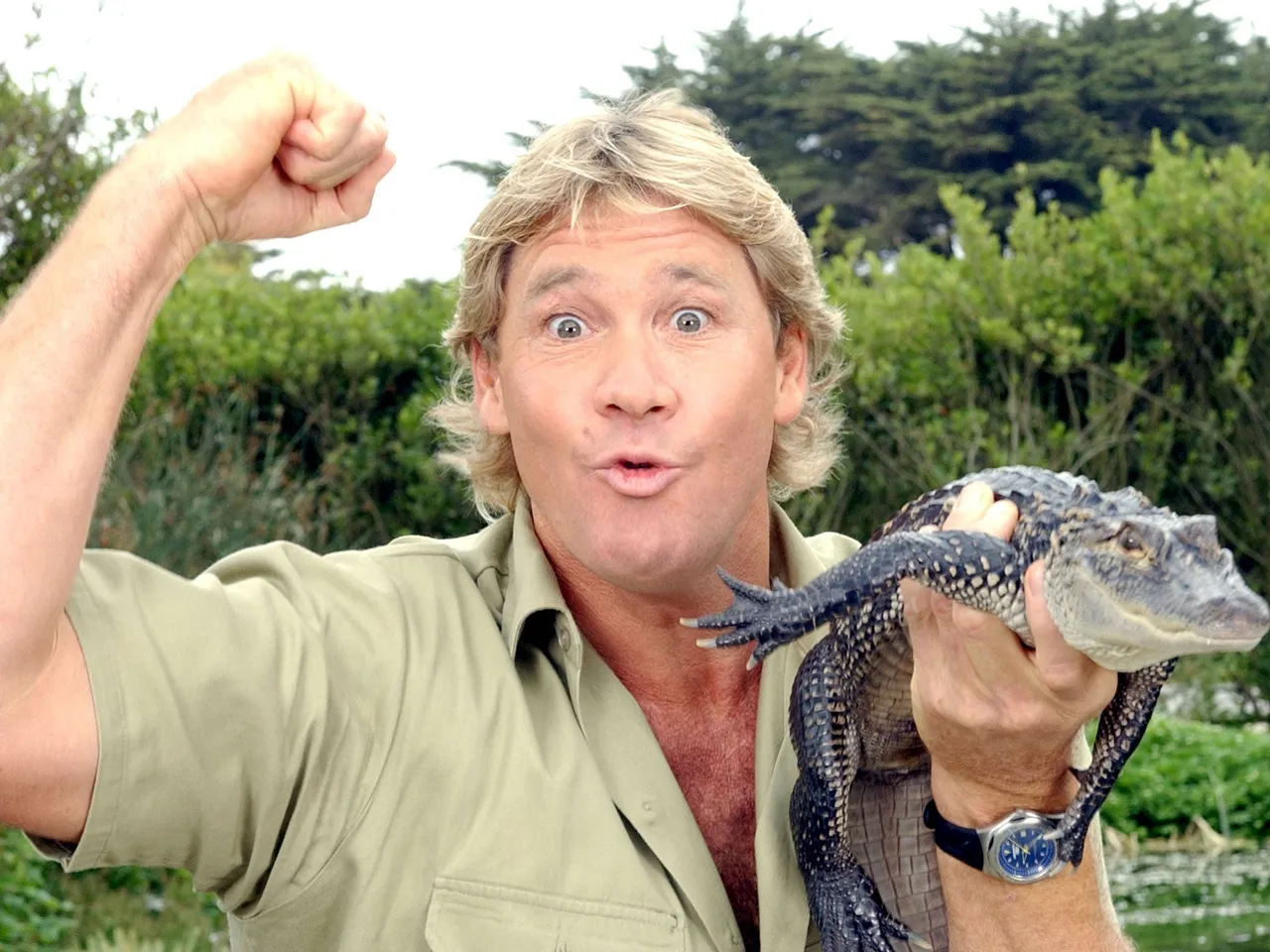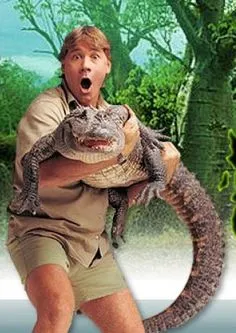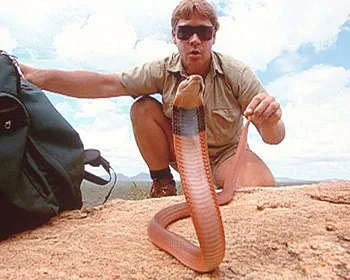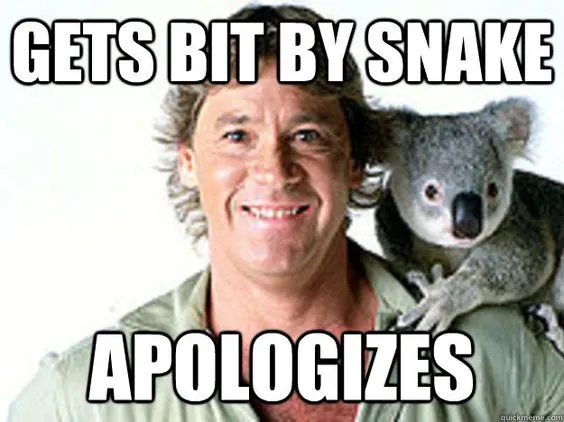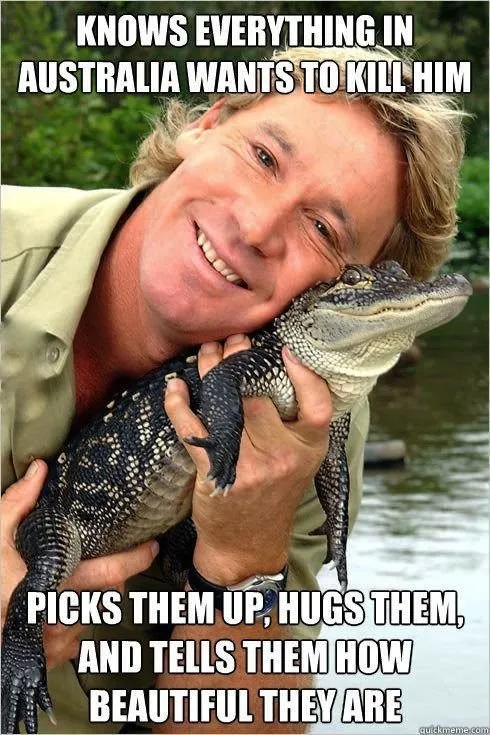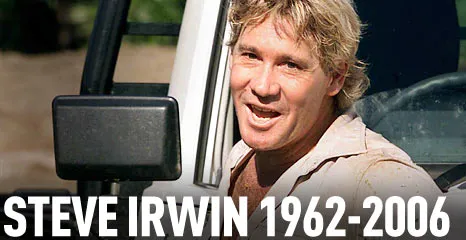As many of you are aware, September 4th marked the 10 year anniversary of the death of Steve Irwin. Widely recognized for his television personality, Steve was a world famous wildlife expert and conservationist, most well-known for his television series “The Crocodile Hunter”. And, by and large, he was loved by the conservation, media, and general community.
I, like many other animal keepers, really admire Steve Irwin and what he accomplished. I have watched (and still occasionally do) just about all of his programs and documentaries on a huge variety of animals. I was really inspired by the man, who devoted his entire life to spreading education and awareness to the entire world. Almost everyone has, at some point or another, watched a documentary by Irwin, even if they aren’t a big advocate for conservation or come from a biological background. He reached an audience that I don’t think has been captured since his death, and I believe that loss of awareness and interest in the natural world has been a blow to the conservation movement.
Recently, I got into what became a heated debate over the legacy of Irwin; this was the first time I had really heard about people opposing what Steve stood for. It kind of came as a surprise to me at first, but the more I tried to look at the argument objectively, the more I was able to at least understand where the argument against him was coming from.
Many people believe that Steve Irwin’s television personality was more detrimental than beneficial. He actively put himself in harm’s way (which led to his death), and he often treated animals in a manner that was not fitting of their nature. He obviously didn’t treat them badly, but he often interacted with the animals in a way that sometimes belied their dangerous or aggressive nature (such as venomous species and his crocs). It was said that his programs were more about showing off his ego and boosting his ratings, often at the expense of the animals by disturbing or scaring them.
I agree that Steve definitely did have quite the personality for television and he, without a doubt, toed the line between educational programming and rating-boosting “danger shots”. But I believe he purposefully, and rather skillfully, worked this to his advantage. His showmanship was a crowd-pleaser, and the prospect of danger added a thrill that excited viewers. People watched his programs because he was an energetic host who got us face to face with dangerous animals, who snapped, lunged, and jumped at him as he spoke. He wasn’t like the usual (dull for most people) nature documentary hosts of the time; he had us on the edge of our seats, exposing the public to animals behaving at their wildest.
Was his own behavior inappropriate? I say no. Irwin was an animal expert, and that expertise can be observed in his interactions with the animals. He recognized their behaviors and signals; he could tell what sort of mood they were in and his respect for them was clear to see. Did he agitate animals to get a good shot? Sometimes, but he never pushed the animals past their limits. Many species reacted to his presence, some more defensively than others, but he never caused them undue amounts of lasting stress that would have a negative impact on their health. When the animals did begin showing observable signs that they were stressed (striking, biting, etc), Steve would back off and give them room, allowing them to settle down from the disturbance rather quickly. Irwin also had a much better understanding of the risks he took than most. He knew when he was in harm’s way and knew the consequences of his errors. When bit, stung or injured, he was quick to point out where he was at fault, and why the animal wasn’t to blame (they react defensively). Steve, like all animal care experts, recognized that wild animals are unpredictable, and you could never be sure how an individual might react. Had he survived the incident with the sting ray, I’m sure he would have reassured us all that the ray wasn’t at fault.
What about his treatment of the animals? While he did treat some rather dangerous species in a manner one might treat a puppy or kitten, I don’t think this was necessarily “bad” (assuming it’s done properly). Again, Irwin was an expert, and even though he might have been sweet-talking a salt-water crocodile, he fully understood the danger the animal posed, and was prepared to react if he saw any warning signs. He regarded the animals as sweet or beautiful, to get the public more engaged and interested, and sometimes even interacted with wild animals as though they were household pets. This is a strategy that has been employed by many conservationists (some with controversy) as a means to connect the viewers to wild animals. While it is never a good idea to treat a wild animal like a pet, Irwin was able to engage audiences with even the most disliked animals (like snakes) by showing them a “sweeter” side of the animal than most people knew. And he was always the first one to point out the potential danger in interacting with a particular animal, remarking that people shouldn’t mess with these animals themselves. While I would never recommend anyone to do things the way he did, I believe he had the knowledge and experience to make those encounters as safe as possible - for himself and the animal.
Some people say that Irwin inspired a generation of wannabe “crocodile-hunters”, many of which are foolish individuals who capture or harass wild animals, sometimes injuring themselves or wildlife in the process. I don’t think Steve can be faulted for this, as he continuously stated that the natural world was best observed and respected from a distance. People react to animals and programs in their own, sometimes misguided, ways (monkey see, monkey do). I believe that he captivated an enormous crowd with his animal antics and inspired many people to follow in his work…and unfortunately, some try to do so in ways that mean well but are executed poorly. Many zoo keepers and animal caretakers credit Steve Irwin for inspiring them to become what they are today!
But did Steve REALLY help the conservation movement? I say yes, absolutely. Today there are many animal programs on TV but far too many of them focus on the “Top Ten Most Dangerous Animals” or programs like “When Animals Attack!” (or last year’s terrible “Eaten Alive” with Paul Rosolie). These shows exist purely for ratings, providing viewers with exciting shots (similar to Irwin’s) of animals behaving in thrilling ways. But these shows lack the educational aspect of Steve’s programs. Steve Irwin’s programs reeled us in with the action shots, but were brilliantly balanced out with plenty of educational information. And his shows reached a world-wide audience, connecting people to animals that were thousands of miles away. He inspired people to care about these animals, and the environments that supported those species. Without his programs, I don’t think conservational awareness would have reached as widespread an audience, and I don’t believe it has since the time of his death.
(This was absolutely unacceptable).
People will always have their opinions, but I believe Steve Irwin was a well-intentioned conservationist who shared his passion with the world. He sought to entertain us while educating us, connecting the public to a world he deeply cared about. His methods were often unorthodox, but I believe this added to both his charm and success as a biologist. And I think it will be a long time before we see someone connect people to nature as easily as Steve Irwin did.
